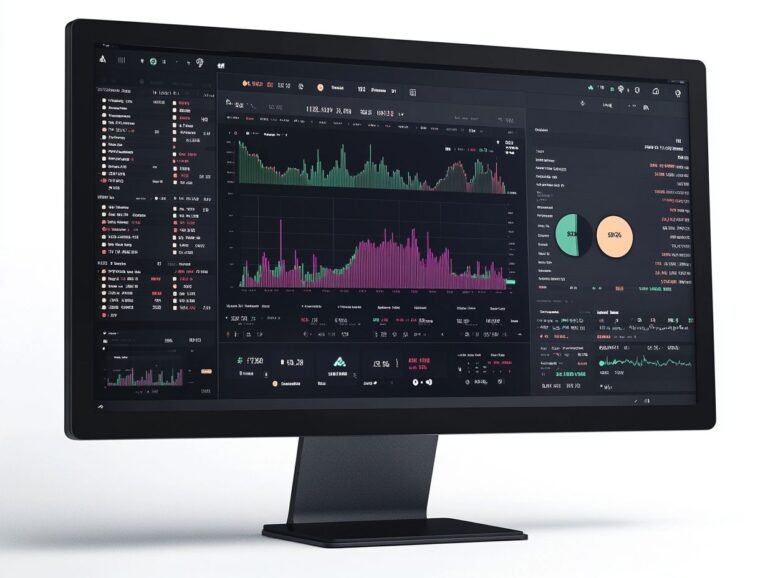Best P2P Crypto Exchanges to Trade Bitcoin Securely
In the rapidly evolving world of cryptocurrency, peer-to-peer (P2P) exchanges have emerged as a popular choice for secure Bitcoin and Ethereum trading.
These platforms connect buyers and sellers directly, offering unique benefits over traditional cryptocurrency exchanges.
Whether you’re a seasoned trader or just starting, understanding how P2P exchanges work, their advantages, and the risks involved is crucial.
This article explores the best P2P crypto exchanges of 2024, guiding you through essential features, payment methods, sophisticated safeguards, and safety tips to make informed trading decisions.
Key Takeaways:
.jpg_00.jpeg)
What are P2P Crypto Exchanges?
P2P crypto exchanges serve as platforms that facilitate peer-to-peer trading of digital currencies, enabling users to engage in direct transactions for cryptocurrencies such as Bitcoin and Ethereum. Unlike traditional cryptocurrency exchanges, these platforms harness a decentralised marketplace model that grants users greater control over their transactions while preserving anonymity. This P2P structure significantly reduces trading costs, a notable benefit for frequent traders and those executing high-volume orders.
By removing the necessity for intermediaries and implementing KYC verification, these exchanges promote direct interaction between buyers and sellers, thereby enhancing the overall trading experience. Users have the autonomy to establish their own terms and prices, making it easier to secure favourable deals while accommodating a diverse range of digital currencies beyond Bitcoin.
“`html
This inherent flexibility not only drives broader adoption of cryptocurrencies but also fosters a community-centric ethos, where individuals transact based on trust and mutual agreement, supported by a user rating system.
Furthermore, a focus on user-driven identity verification methods and sophisticated safeguards bolsters privacy and security in the rapidly evolving cryptocurrency landscape. For those interested in exploring the best platforms, check out the Best P2P Crypto Exchanges to Trade Bitcoin and Ethereum Securely.
“`
How Do P2P Crypto Exchanges Work? Understanding the Transaction Process
P2P crypto exchanges operate through a uniquely efficient trading process that directly connects buyers and sellers, facilitating cryptocurrency transactions without the need for intermediaries in a decentralized marketplace. At the heart of this system is an escrow service that temporarily safeguards the cryptocurrency until both parties have met their obligations, ensuring transaction security and mitigating risks associated with price volatility and other market movements. This user-centric design creates a more flexible trading environment, allowing participants to select their preferred payment methods and trading partners.
These platforms enable users with a diverse array of trading strategies, ranging from limit orders, which enable sellers to set their desired prices, to instant transactions that cater to urgent trading needs and emerging tokens. Each strategy is tailored to accommodate varying user preferences, thereby enhancing overall satisfaction.
By offering a wide range of payment options—including local bank transfers, credit cards, and digital wallets—the exchange significantly enhances accessibility. This commitment to user experience not only streamlines transactions but also fosters trust and transparency within the community, encouraging deeper engagement in the ever-evolving cryptocurrency market.
Advantages of P2P Crypto Exchanges: Enhancing Your Trading Experience
The advantages of P2P crypto exchanges are abundant, presenting a compelling alternative to traditional cryptocurrency exchanges for those seeking secure and efficient trading options.
With a user-centric design, these platforms cultivate a seamless trading experience that resonates with both novice crypto traders and experienced traders alike. Their benefits include:
- Lower trading costs
- A diverse array of payment methods and local payment methods
- Enhanced transaction security through escrow systems and multi-signature wallets, effectively protecting users from fraudulent activities
Furthermore, P2P exchanges expand trading opportunities by enabling users to engage in direct trades with a wide variety of trading partners, thus increasing trading volume.
Benefits of P2P Trading: Maximizing Portfolio Diversification
P2P trading presents unique advantages tailored to a diverse array of cryptocurrency enthusiasts, particularly in fostering a secure environment for cryptocurrency transactions. The flexibility inherent in trading options allows users to negotiate terms directly with their trading partners, facilitating the use of various local payment methods that often elude centralised exchanges. This adaptability not only enhances portfolio diversification but also mirrors the dynamic nature of market trends and trading dynamics.
By leveraging the capabilities of direct interactions, individuals frequently discover more competitive pricing, unencumbered by the fees typically associated with traditional platforms. This system cultivates trust and transparency, as users can review feedback and ratings of potential partners, thereby bolstering the overall security of their transactions through the user rating system.
Furthermore, P2P platforms enable users to connect with local traders, effectively eliminating currency conversion costs and streamlining the trading process through flexible trading options. As a result, these features not only simplify the trading experience but also foster a sense of community among participants, enriching the overall engagement within the trading landscape.
Who Can Benefit from P2P Crypto Exchanges?
P2P crypto exchanges are meticulously crafted to accommodate a diverse array of user profiles, ranging from novice crypto traders in search of a secure entry point to seasoned investors eager for advanced trading strategies. The focus on user anonymity combined with regulatory compliance renders these exchanges particularly attractive to individuals who prioritise privacy in their cryptocurrency dealings. This inclusive atmosphere promotes participation from various backgrounds, cultivating a dynamic trading community.
In this setting, novice traders can easily navigate transactions without the complexities often associated with traditional exchanges. Meanwhile, more experienced users can exploit the platform’s unique features to execute intricate trading strategies and seize market fluctuations. For those with specific payment preferences, P2P exchanges offer the flexibility to accommodate various methods, ensuring smoother transactions tailored to individual requirements.
Whether an individual aims to engage in small trades or execute high-volume orders, the adaptability of these platforms caters to a wide spectrum of financial objectives, providing a seamless experience customised to distinct trading aspirations.
Comparing P2P Platforms and Traditional Crypto Exchanges: Understanding Trading Dynamics
.jpg_01.jpeg)
In the comparison between P2P platforms and traditional crypto exchanges, several key factors come to light that underscore the unique advantages and limitations inherent to each option.
P2P platforms stand out for their lower trading costs and heightened user anonymity, enabling traders to engage in direct trades tailored to their individual preferences, supported by smart contracts. Conversely, traditional exchanges like KuCoin, Bitget, Binance, and MEXC generally boast greater liquidity and more comprehensive customer support; however, they often enforce stricter regulatory compliance, which can limit user freedom.
A nuanced understanding of these dynamics enables traders to make informed decisions that align with their specific needs and trading strategies.
Top P2P Crypto Exchanges for Trading Bitcoin and Ethereum in 2024
In the exploration of the premier P2P crypto exchanges for trading Bitcoin and Ethereum in 2024, it is essential to emphasise platforms that exhibit a strong trading reputation, platform reliability, and robust liquidity. These exchanges not only facilitate seamless transactions but are also recognised for their unwavering commitment to security and user satisfaction, offering a user-friendly interface.
Notable features, such as advanced safeguards like two-factor authentication and meticulous transaction monitoring, further instil confidence, allowing users to engage in trading with assurance within a secure environment.
Key Features to Look For
When selecting a P2P crypto exchange, it is crucial for users to take into account key features that significantly enhance the trading experience, including a user-friendly interface, flexible trading options, and reliable customer support.
The design of the interface plays a pivotal role in shaping user engagement, making it essential to opt for a platform that is both intuitive and easy to navigate, particularly for those new to the world of cryptocurrency, like Gemini, OKX, Bybit, and Gate.io. The speed and effectiveness of customer support further influence trading efficiency; timely assistance can swiftly resolve any issues that may arise during transactions.
Additionally, users should investigate various security protocols, such as two-factor authentication (2FA) and encryption standards, which serve to protect sensitive information from potential breaches. Comprehensive reviews and community feedback offer valuable insights into the overall reliability of a P2P exchange, ensuring a safer and more secure trading experience.
How to Trade on P2P Crypto Exchanges
Trading on P2P crypto exchanges presents a seamless experience, commencing with the creation of an account and the exploration of an intuitive interface designed for user convenience.
Participants can effortlessly browse through available listings to identify suitable trading partners or can take the initiative to post their own offers for buying or selling Bitcoin and Ethereum.
The trading process typically involves selecting preferred payment methods, ensuring mutual agreement on transaction terms, and using escrow services to protect the trade until its successful completion.
Payment Methods Accepted
P2P crypto exchanges typically offer an impressive array of payment methods, granting traders substantial flexibility in their transactions. Among the most common options are local bank transfers, credit cards, and even alternative cryptocurrencies for direct trades.
This diverse selection significantly enhances the trading experience, enabling users to select payment methods that align with their individual needs while ensuring secure and efficient cryptocurrency transactions. For example, utilising e-wallet services can provide immediate access to funds, allowing individuals to swiftly capitalise on market opportunities.
Moreover, mobile payment platforms are increasingly facilitating on-the-go trading, appealing to a tech-savvy audience that values convenience. Transaction fees fluctuate across various methods, enableing users to choose options that resonate with their financial preferences. This creates an environment where trading is not only flexible but also cost-effective.
Cost and Fees of P2P Crypto Trading
Understanding the costs and fees associated with P2P crypto trading is essential for traders seeking to make informed decisions as they navigate the ever-changing market trends. Unlike traditional exchanges, P2P platforms frequently offer lower trading fees, allowing users to preserve a greater share of their profits.
However, it is vital to account for additional costs that may arise from specific payment methods or transaction types, which can differ across platforms.
Factors such as wallet fees, verification costs, and withdrawal fees can accumulate, significantly affecting the overall trading experience. Traders must also remain vigilant regarding the potential for price premiums during periods of volatility, as these can further impact their choices.
The selection of a specific P2P platform can involve varying levels of service fees, security measures, and user support.
As individuals contemplate these factors, they can refine their strategies and position themselves for more favourable outcomes in the rapidly evolving crypto landscape.
Risks and Security Considerations
.jpg_10.jpeg)
While P2P crypto exchanges present a multitude of advantages, they are not without their inherent risks and security considerations that users must recognise.
The security of transactions takes precedence; thus, it is essential for users to seek platforms that employ advanced safeguards and robust protocols to mitigate the threat of fraud.
By comprehending these risks, traders are better equipped to implement necessary precautions, ultimately enhancing their trading experience in a more secure environment.
How to Stay Safe During P2P Transactions
Ensuring safety during P2P transactions necessitates heightened awareness and proactive measures to bolster transaction security while preserving user anonymity.
It is imperative for participants to implement a robust verification process, such as requesting a video call or validating identities through social media profiles, to ascertain legitimacy. This approach significantly mitigates the risks associated with fraudulent activities. While escrow services are essential, users must also select reputable platforms to avoid potential scams. Maintaining anonymity remains critical; individuals should refrain from disclosing personal information beyond what is essential for the transaction and may consider employing pseudonyms or secure wallet addresses.
By following these safety guidelines, users can markedly reduce risks and foster a more secure trading environment.
Tax Implications of P2P Crypto Trading
Understanding the tax implications of P2P crypto trading is essential for traders aiming to remain compliant with regulatory requirements. Since cryptocurrency transactions are often classified as taxable events, it is imperative for users to meticulously track their trades and report any profits or losses in line with local laws. This level of diligence not only mitigates the risk of legal complications but also enables traders to make informed financial decisions.
To navigate these responsibilities effectively, individuals are encouraged to utilise specialised software or platforms that automate trade tracking and provide clear records for reporting purposes. This technology streamlines the process, facilitating the seamless calculation of gains or losses for tax filings. Awareness of specific regulations within one’s jurisdiction is critical, as some regions may impose unique requirements on cryptocurrency earnings.
Ultimately, a comprehensive understanding of these factors can significantly bolster compliance efforts and protect users against potential legal consequences, allowing them to concentrate on their trading strategies with enhanced confidence.
Frequently Asked Questions (FAQ)
The Frequently Asked Questions (FAQ) section serves as a valuable resource for addressing common inquiries surrounding P2P crypto exchanges, illuminating the intricacies of trading strategies and market dynamics.
Users frequently seek clarity regarding the safety of P2P platforms, the anonymity of transactions, and the overall reliability of the trading environment. By thoughtfully addressing these concerns, one can offer deeper insights into the advantages and potential risks inherent in P2P trading.
Are P2P Crypto Exchanges Safe?
P2P crypto exchanges can indeed be secure, provided users exercise due diligence and select platforms equipped with robust transaction security measures. Features such as an effective user rating system and escrow services enhance the trading environment, fostering trust between trading partners. It is essential for users to remain vigilant and adhere to best practices to safeguard their interests.
To further bolster their security, individuals should familiarise themselves with the trading process and utilise platforms that incorporate two-factor authentication and secure communication channels. Conducting thorough background checks on potential trading partners by reviewing their feedback and transaction history is also advisable. Users must refrain from sharing sensitive personal or financial information and consider transacting in smaller amounts during initial trades to mitigate risk.
Choosing platforms that provide dispute resolution services can offer an additional layer of reassurance, ensuring that a clear process for resolution is in place should any issues arise.
Can I Trade Anonymously on P2P Crypto Platforms?
While numerous P2P crypto platforms may promise user anonymity, some necessitate KYC verification to adhere to regulatory standards. This verification process can curtail the level of anonymity available to users, but it simultaneously enhances security and trust within the trading environment. Understanding the delicate balance between anonymity and compliance is essential for traders intent on preserving their privacy during transactions.
In the realm of cryptocurrency trading, where decentralisation stands as a core principle, the role of KYC presents a paradox. For those wishing to engage in peer-to-peer transactions out of sight, the imposition of mandatory identity checks raises pertinent questions regarding the safety of personal data and the potential compromise of privacy.
This layer of regulation is designed to thwart illicit activities; however, it creates a tension between user autonomy and the necessity for a secure trading atmosphere. By recognising these complexities, participants are enableed to make informed decisions that resonate with their priorities, be it the convenience of trading or the critical need to safeguard personal information.
Frequently Asked Questions
.jpg_11.jpeg)
What are P2P crypto exchanges?
P2P crypto exchanges are platforms that allow users to buy and sell cryptocurrencies directly with each other, without the involvement of a third-party intermediary. This allows for more secure and private transactions.
Why should I trade Bitcoin on a P2P exchange?
P2P exchanges offer a decentralised and secure environment to trade Bitcoin and other digital currencies. With no central authority controlling the transactions, this setup reduces the risk of hacking or theft of your funds.
What are the best P2P crypto exchanges for trading Bitcoin and Ethereum securely?
Some of the top P2P crypto exchanges include LocalBitcoins, Paxful, and Bisq, as well as emerging platforms like KuCoin and Binance. These platforms offer a variety of sophisticated safeguards, such as escrow services, two-factor authentication, and a user rating system to ensure a secure trading experience.
How do I choose the best P2P crypto exchange for trading Bitcoin securely?
When choosing a P2P crypto exchange, make sure to research the platform’s security measures, user reviews, and reputation in the crypto community. Look for features such as robust liquidity, diverse selection of cryptocurrencies, and intuitive interface. It is also important to use strong passwords and enable two-factor authentication for an extra layer of security.
Are P2P crypto exchanges safe?
While P2P exchanges offer more security and privacy compared to centralised exchanges, and often provide user anonymity and regulatory compliance, it is important to note that they are not completely risk-free. It is always recommended to use caution and follow best security practices when trading on any platform.
Can I use any type of cryptocurrency on P2P exchanges?
Most P2P exchanges offer a diverse selection of cryptocurrencies for trading, including Bitcoin, Ethereum, and Litecoin. Additionally, some platforms may support emerging tokens and offer features like copy trading and local payment methods. However, it is important to check which cryptocurrencies are supported by the specific exchange before trading.





